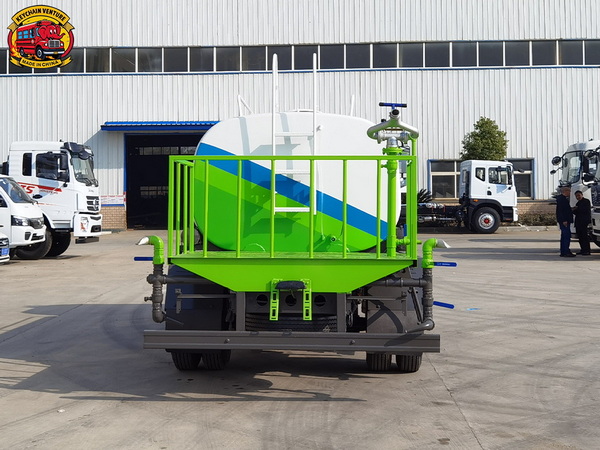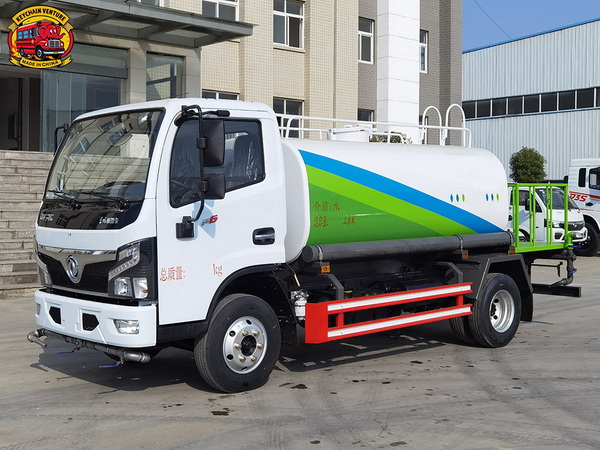Views: 222 Author: Amanda Publish Time: 2025-08-25 Origin: Site








Content Menu
● Are Water Trucks Considered Commercial Vehicles?
● What Is a CDL and Why Is It Important?
● Do You Need a CDL to Drive a Water Truck?
>> Understanding Vehicle Weight and CDL Thresholds
>> Examples of Typical Water Truck Licensing Requirements
>> Variability by Jurisdiction
● Why Do CDL Requirements Matter for Water Truck Operators?
● Essential Training and Skills for Water Truck Drivers
>> Operating Pump and Spray Systems
>> Vehicle Inspection and Maintenance
>> Compliance with Safety Protocols
● Safety Considerations for Water Trucks
● Technological Advances Enhancing Water Truck Operation
● Summary: Key Points on Driving a Water Truck and CDL Requirements
● Frequently Asked Questions (FAQs)
>> 1. Do I need a CDL to operate a small water truck under 10,000 pounds GVWR?
>> 2. What CDL class is required to drive a heavy-duty water truck?
>> 3. Can I operate a water truck with just a regular driver's license?
>> 4. Are there special endorsements needed for water trucks carrying hazardous materials?
>> 5. What kind of training should a water truck driver receive?
Driving a water truck might seem straightforward at first glance, but there are essential legal requirements and skills that come into play—especially when considering whether you need a Commercial Driver's License (CDL). If you're exploring a career involving water trucks, managing a construction site, or simply curious about the regulations surrounding these vehicles, this comprehensive guide will cover everything you need to know.
In this article, we'll dive deep into what a water truck is, the various jobs it performs, the licensing requirements including the need for a CDL, safety tips, operational considerations, and other key information. By the end, you'll have a solid understanding of whether driving a water truck requires a CDL and the all-important legal and practical factors involved.

A water truck is a vehicle designed to transport and distribute water for a wide range of applications. These trucks can range in size from small utility vehicles used on farms and minor projects to large heavy-duty trucks deployed in mining, firefighting, dust control, and municipal maintenance.
Water trucks typically feature a large water tank mounted on a truck chassis and equipped with spray bars, hoses, or nozzles to effectively disperse water across specified areas. These vehicles serve vital functions, including:
- Dust suppression on construction sites, dirt roads, and mining operations, reducing airborne particles to promote a safer working environment.
- Soil compaction in road construction and civil engineering projects, as water helps pack the soil for better stability.
- Firefighting and emergency water delivery, often serving as support vehicles in wildfire scenarios or municipal emergencies where water supply access is limited.
- Agricultural irrigation and livestock watering, particularly in areas without fixed irrigation systems.
- Environmental and industrial applications, such as restoring green spaces, landscaping, or industrial dust control.
Understanding the diversity of water trucks' applications highlights why their operation involves more than just driving — knowledge of the vehicle's mechanisms and compliance with regulations is essential.
Water trucks used for business purposes are generally classified as commercial motor vehicles (CMVs). They are operated by companies in construction, mining, municipal services, agriculture, and emergency response sectors. Because CGVs transport large volumes of water and often have considerable weight, regulatory bodies oversee their operation closely to ensure public safety on roads and jobsites.
Whether a water truck is classified as a commercial vehicle also depends on its weight and the jurisdiction's definitions. For example, in the United States, any vehicle used for business purposes weighing more than 10,000 pounds typically falls into the commercial vehicle category, triggering commercial insurer requirements, licensing rules, and safety standards.
A Commercial Driver's License (CDL) is a special driver's license required to operate certain types of commercial motor vehicles. The CDL ensures that drivers have the necessary training, skills, and knowledge to operate heavy, complex vehicles safely.
The CDL classification system primarily breaks down as follows:
- Class A CDL: For combination vehicles (truck and trailer) with a gross combination weight rating (GCWR) over 26,001 pounds, when the towed vehicle weighs over 10,000 pounds.
- Class B CDL: For any single vehicle with a gross vehicle weight rating (GVWR) of 26,001 pounds or more, or towing a vehicle that weighs 10,000 pounds or less.
- Class C CDL: For vehicles designed to carry 16 or more passengers, or those transporting hazardous materials requiring special endorsements.
CDLs help promote road safety by requiring drivers to pass knowledge and skills tests, maintain clean driving records, and complete periodic medical evaluations. For water truck drivers, possessing the relevant CDL is often both a legal necessity and a professional responsibility.
The short answer is: it depends on the size and weight of the water truck you intend to operate and the laws of the region where you are driving.
The key factor that determines CDL requirements for a water truck is its gross vehicle weight rating (GVWR), which includes the truck's own weight plus the maximum load it carries.
- Water trucks with a GVWR less than 26,001 pounds: In most jurisdictions, these water trucks do not require a CDL. Operators can typically drive with a regular driver's license, though some employers may require additional training for safety.
- Water trucks with a GVWR of 26,001 pounds or more: Operating these larger vehicles generally requires at least a Class B CDL because the vehicle falls into the heavy commercial motor vehicle category.
- Towing trailers: If a water truck is towing a trailer over 10,000 pounds in addition to the truck's weight, a Class A CDL is required.
- Small water trucks: These might be pickup trucks fitted with water tanks, often used on small sites or farms; since their GVWR is usually below the CDL threshold, no CDL is required.
- Medium-sized water trucks: Often used in construction or municipal dust control; these may require a Class B CDL if their GVWR is above 26,001 pounds.
- Heavy-duty water trucks: Common in mining or firefighting; these almost always require a Class B or Class A CDL.
It's crucial to understand that CDL laws differ between countries, states, and provinces. For instance:
- United States: FEMA and FMCSA regulations set the CDL standards, but individual states may have specific endorsements or exceptions.
- Canada: Provincial rules apply, with similar weight-based CDL requirements.
- China: While not using the CDL acronym, licensing regulations require drivers of heavy trucks exceeding certain weight limits to have specialized commercial vehicle licenses.
Always consult local transportation and licensing authorities to verify precise requirements.

Operating a water truck without the proper credentials can lead to serious consequences:
- Legal Penalties: Fines, penalties, or even criminal charges depending on severity.
- Insurance Issues: Insurance claims may be denied if the operator lacked the correct license at the time of an incident.
- Employer Liability: Companies may be held accountable for noncompliance, risking fines and damage to reputation.
- Safety Risks: Unlicensed or untrained operators may be less capable of handling the vehicle safely, increasing accident risk.
Therefore, compliance with CDL requirements protects drivers, companies, and the public.
Even if a CDL is not legally required, driving a water truck involves unique hazards demanding specialized knowledge and experience. Some critical skills and training areas include:
Unlike solid cargo, water moves inside the tank, creating a “surge effect” during acceleration, braking, or cornering, which can destabilize the vehicle. Drivers need to understand how to manage this by controlling speed and smooth driving.
Water trucks typically have pumps, hoses, and spray bars to disperse water. Proper operation and maintenance of this equipment require technical training to avoid damage and ensure efficient use.
Given exposure to water, corrosion risk, and mechanical wear, drivers should perform routine vehicle inspections focusing on brakes, tank integrity, spray equipment, and tires.
Water trucks often operate on rough terrain and in confined construction zones, requiring skilled maneuvering and hazard awareness.
Knowledge of personal protective equipment, site-specific safety rules, and emergency response procedures is necessary.
Operating a water truck safely requires attention beyond standard vehicle driving practices:
- Adjust Speed According to Conditions: Fully loaded water trucks have longer braking distances, so speed adjustments are critical especially on slopes or slippery surfaces.
- Secure Loads Properly: Proper maintenance of tank lids and valves is necessary to prevent water loss or spill-related hazards.
- Awareness of Surroundings: Construction zones and firefighting areas often pose unexpected obstacles.
- Weather Impacts: Wet or icy roads can worsen handling; caution must be exercised.
- Communication: Coordination with site managers or firefighting teams minimizes operational risks.
Modern water trucks supplied by companies such as KeyChain Venture Co., Ltd., integrate technological features that help drivers and fleet managers improve safety and efficiency:
- Telematics and GPS Tracking: Enables route optimization and real-time vehicle monitoring.
- Tank Level Sensors: Automatically monitor and report water levels, reducing risk of dry running.
- Remote Spray Control: Allows drivers to operate spray equipment without leaving the cab.
- Collision Avoidance Systems: Protect operators in busy or hazardous job sites.
- Hybrid and Electric Powertrains: Emerging trends in environmentally friendly water truck designs.
These innovations complement driver training and regulatory compliance to enhance overall performance and safety.
- The need for a CDL depends primarily on the water truck's GVWR and whether you are towing a heavy trailer.
- Small water trucks with GVWR below 26,001 pounds typically do not require a CDL.
- Medium and heavy-duty water trucks usually require a Class B or Class A CDL to operate legally.
- Local regulations vary and must be checked before operation.
- Proper driver training, vehicle inspection, and adherence to safety protocols are crucial regardless of CDL status.
- Modern water trucks incorporate technology that enhances safety and operational control.
Water trucks are indispensable vehicles across many industries, performing roles that range from dust control to firefighting support. Whether you need a CDL to drive a water truck depends on the truck's gross vehicle weight, whether it tows trailers, and the jurisdiction's licensing laws. For most heavy-duty water trucks, obtaining a Class B or Class A CDL is mandatory. Smaller water trucks, particularly those under 26,001 pounds GVWR, often only require a standard driver's license.
However, regardless of the legal licensing requirements, comprehensive driver training, safety awareness, and understanding vehicle-specific handling characteristics are vital for safe and efficient operation.
At KeyChain Venture Co., Ltd., we are committed to providing high-performance, reliable water trucks tailored to meet diverse operational needs. We also emphasize the importance of proper driver licensing and training to ensure safety and legal compliance for our clients worldwide.

No. In most cases, small water trucks with GVWR under 26,001 pounds do not require a CDL and can be driven with a standard driver's license.
Generally, a Class B CDL is required for driving a water truck with a GVWR above 26,001 pounds. If towing a heavy trailer, a Class A CDL may be necessary.
Yes, if the water truck's GVWR is below the CDL threshold and local laws permit, a regular driver's license is sufficient.
Yes. If the water truck transports hazardous substances or chemicals, a Class C CDL with a hazmat endorsement is typically required.
Training should cover vehicle handling with liquid loads, operation of spray equipment, safety protocols on job sites, emergency procedures, and vehicle maintenance.